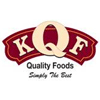Halal food producer presses for higher monitoring standards
- Like
- Digg
- Del
- Tumblr
- VKontakte
- Buffer
- Love This
- Odnoklassniki
- Meneame
- Blogger
- Amazon
- Yahoo Mail
- Gmail
- AOL
- Newsvine
- HackerNews
- Evernote
- MySpace
- Mail.ru
- Viadeo
- Line
- Comments
- Yummly
- SMS
- Viber
- Telegram
- Subscribe
- Skype
- Facebook Messenger
- Kakao
- LiveJournal
- Yammer
- Edgar
- Fintel
- Mix
- Instapaper
- Copy Link
Posted: 27 March 2013 | Robin Gregson | 2 comments
KQF has denounced as ‘shameful’ recent lapses in food monitoring processes…


Halal food producer, KQF, has denounced as ‘shameful’ recent lapses in food monitoring processes that have allowed British manufacturers and retailers to sell horse, pork and other uncertified meats as part of food products labelled as ‘halal’.
Mr Faruk Vali, managing director of the Lancashire based business, believes the recent failures are symptomatic of a wider problem within the halal meat industry and that they point to a need for more robust safeguards at every stage of the production process.
“The integrity of food is of great religious importance to Muslims,” he explains. “To find that pork or horse meat has somehow found its way into supposedly halal foods is therefore something that goes far beyond a matter of simple distaste; it has an impact on one’s faith.
“The fact that some manufacturers have allowed such lapses to occur points to a failure in the monitoring and certification systems that they have adopted. In my view, the only wholly reliable system is one that entails having an on-site inspector from the halal certification body permanently stationed at the food processing plant, and another inspector at whichever slaughterhouse the meat originates. It is a matter of having eyes and ears on the ground – a constant, impartial and human-based monitoring system that protects the integrity of the food at every stage.
“Some halal monitoring bodies are quite stringent in their methods and they place inspectors (at the food producers’ expense) in the abattoirs and on the production lines so that there is never a time when operations are not being monitored. This, in our view, is the ideal, and it is similar in many respects to the Jewish system, whereby food cannot be regarded as kosher if it has been ‘obscured from the eye.’ In other words, food should be kept under strict observation to ensure that proper processes are being adhered to, and when the food is stored or transported, it should be sealed in locked and tamper-evident containers.”
For its part, KQF operates under the full-time supervision of on-site inspectors from the Halal Monitoring Committee (HMC) and it only works with slaughterhouses that have the same independent controls in place. This inevitably incurs higher costs than systems that rely only on periodic ‘spot-checks’ but the company believes it is the only way to prevent accidents or deliberate abuses from taking place.
“If food is constantly supervised and if it remains under lock and key when it is out of sight, then the opportunities for non-halal materials to enter the production process are virtually non-existent,” asserts Vali. “It entails a higher cost, some of which is passed on to the customer, but it raises an important question for the ordinary consumer: what price do you put on the integrity of your food?
“In times of economic hardship, price tends to become an increasingly important factor in the minds of customers and producers generally try to respond by minimising their costs wherever they can. In such a scenario, those with really reliable halal monitoring procedures in place can be faced with a strong temptation to reduce costs by opting for a cheaper inspection and certification system, but that presents a greater risk of failures and allows greater scope for abuse.
“In a sense, the demand for ever cheaper halal food products creates a tension between religious principle and the profit motive. However, just as Muslim consumers must ask themselves how seriously they value the integrity of their food, so producers need to ask to what extent – it at all – they will compromise their principles in the quest for profit. If true religious devotion is what is driving a halal food producer then there should never be a question of trying to bend the rules or circumvent processes. Muslims believe that nothing can be hidden from Almighty God, so in my view, observing the proper processes should be automatic and conducted without compromise.
“We believe that continuous on-site inspection provides the strongest safeguards against the kinds of failures the industry has seen in recent weeks but no system is entirely infallible and if more can be done to drive up standards and protect food integrity more forcefully, then KQF would certainly support any efforts in that direction.”




Excellent article.
Stringent human based monitoring and on-site inspection is the most effective way of ensuring the integrity of the food that we eat.
Thank you so much for this article which really have been so helpfull For All Muslims its the religious food and also best choice.